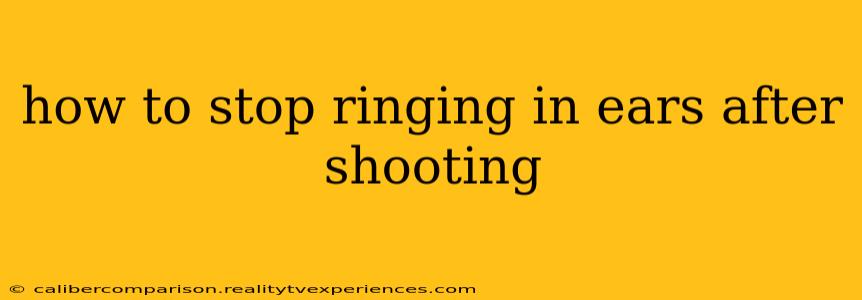Experiencing ringing in your ears (tinnitus) after shooting is a common concern among firearm enthusiasts. While a brief period of ringing might be normal, persistent tinnitus requires immediate attention. This comprehensive guide explores the causes of shooting-induced tinnitus, effective management strategies, and preventative measures to protect your hearing.
Understanding Shooting-Induced Tinnitus
The loud reports from firearms generate intense sound waves that can damage the delicate hair cells within your inner ear. This damage is the primary cause of tinnitus, a condition characterized by a persistent ringing, buzzing, hissing, or clicking sound in one or both ears. The severity of tinnitus depends on several factors, including:
- The type of firearm: Higher-caliber weapons and those lacking effective suppressors produce significantly louder sounds.
- The proximity to the firearm: Being closer to the muzzle increases your exposure to intense sound waves.
- Duration of exposure: Extended shooting sessions amplify the risk of hearing damage.
- Hearing protection: The absence or inadequate use of hearing protection significantly increases the likelihood of tinnitus.
Immediate Actions After Shooting
If you experience ringing in your ears after shooting, take these steps immediately:
- Remove yourself from the noisy environment: Move to a quieter location to minimize further sound exposure.
- Assess the severity: Note the intensity and duration of the ringing. If it's severe or persistent, seek medical attention promptly.
- Avoid loud noises: Protect your ears from additional noise exposure.
Management Strategies for Tinnitus
While complete reversal of tinnitus is not always possible, various strategies can help manage its symptoms and improve your quality of life. These include:
Medical Interventions:
- Consult an audiologist or ENT specialist: A thorough hearing evaluation is crucial to determine the extent of hearing damage and the best course of action. They might recommend treatments aimed at reducing the perception of tinnitus.
- Sound therapy: This involves using specific sounds or white noise to mask the tinnitus and reduce its perceived intensity.
- Cognitive behavioral therapy (CBT): CBT can help you cope with the emotional distress associated with chronic tinnitus.
- Medication: In some cases, medications might be prescribed to manage underlying conditions contributing to tinnitus or to alleviate associated anxiety or depression.
Lifestyle Modifications:
- Minimize exposure to loud noises: This includes using hearing protection during shooting, attending concerts, or operating loud machinery.
- Manage stress levels: Stress can exacerbate tinnitus symptoms. Engage in relaxation techniques like yoga, meditation, or deep breathing exercises.
- Maintain a healthy lifestyle: A balanced diet, regular exercise, and sufficient sleep can contribute to overall well-being and potentially improve tinnitus management.
- Limit caffeine and alcohol consumption: These substances can potentially worsen tinnitus symptoms for some individuals.
Preventing Shooting-Induced Tinnitus: Prioritize Hearing Protection
The best approach to managing tinnitus is prevention. Always prioritize proper hearing protection when shooting:
- Use hearing protection rated for firearms: Choose hearing protection with a Noise Reduction Rating (NRR) appropriate for the firearms you use.
- Wear hearing protection consistently: Do not remove your hearing protection until you have ceased shooting for the day.
- Consider electronic hearing protection: These devices amplify surrounding sounds while protecting against loud noises, allowing for better communication and situational awareness.
When to Seek Medical Attention
Seek immediate medical attention if:
- You experience sudden or severe hearing loss.
- Your tinnitus is accompanied by dizziness, vertigo, or other neurological symptoms.
- Your tinnitus significantly impacts your quality of life.
By understanding the causes of shooting-induced tinnitus and implementing appropriate preventative and management strategies, you can protect your hearing and maintain a fulfilling life as a firearm enthusiast. Remember, prevention is key, and seeking professional help when necessary is crucial for effective management of this condition.

